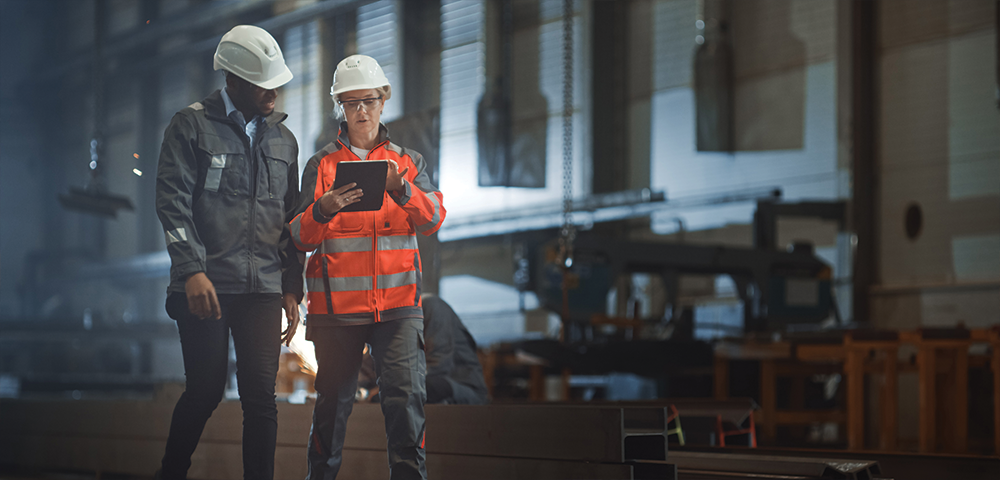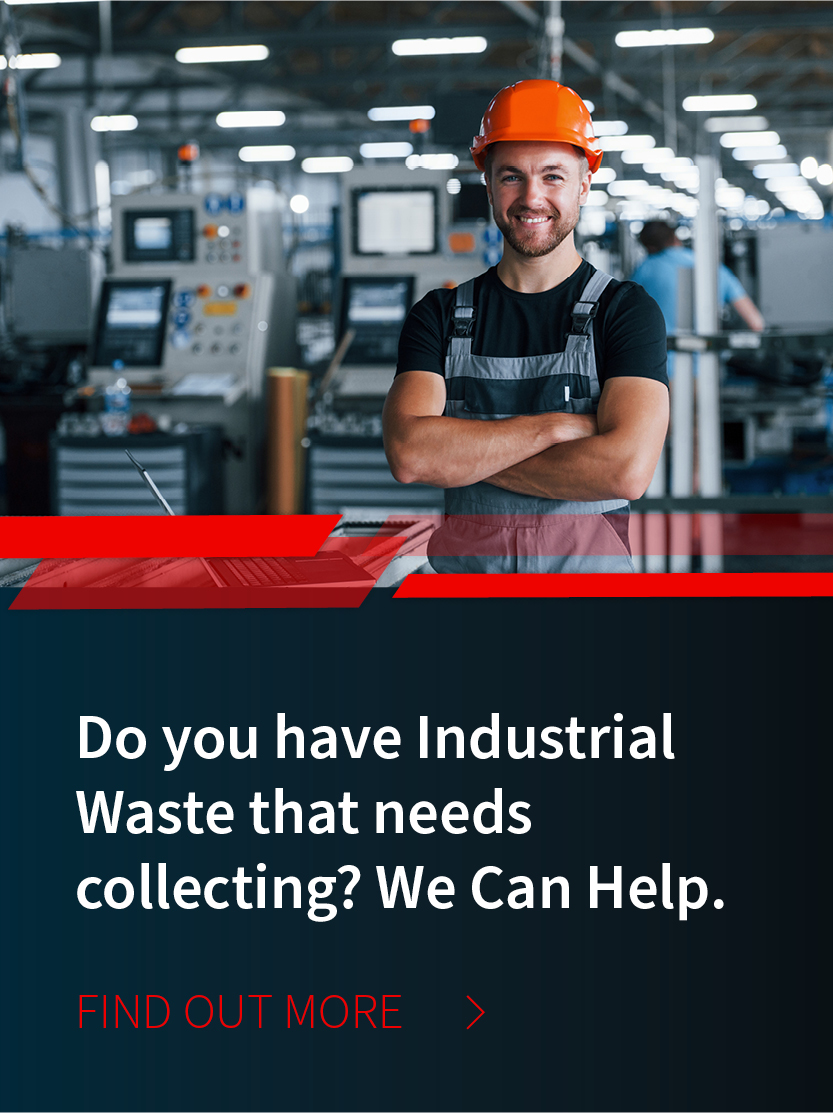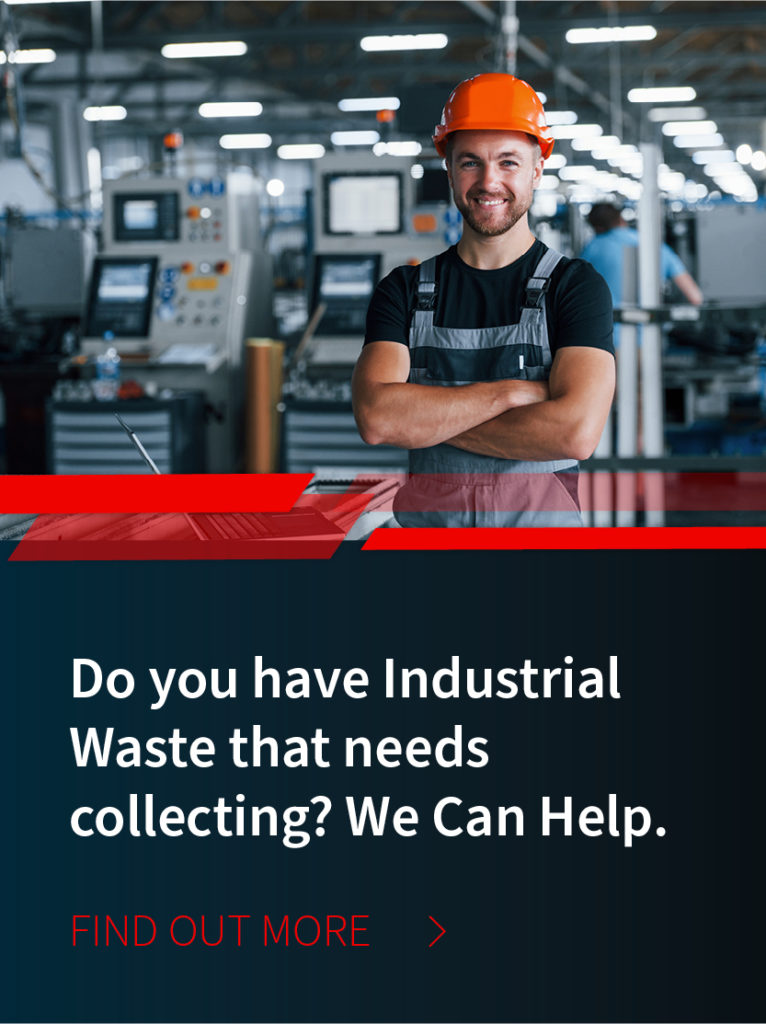
/ IN THIS BLOG
01 / Clarifying industrial waste terminology
One of the most confusing categories of waste management is what’s often called “manufacturing waste” but, per the EPA, is formally referred to as “industrial waste” and—more specifically—as “non-hazardous industrial waste.”
When EPA officials refer to industrial waste, they’re typically talking about something that’s neither dangerous nor harmful endemically to human health or the environment. Thereby, it does not require hazardous waste disposal.
However, what most people think of as industrial waste (or what they might call manufacturing waste) is any material rendered useless during a manufacturing process that requires eventual disposal, e.g., dirt, gravel, masonry, concrete, scrap metal, oil, solvents, chemicals, scrap lumber, etc.
Too often, this conflation muddles the conversation about general waste management. And so to bring order to chaos, we counsel our partners to think of industrial waste in three discrete streams:
- Non-hazardous industrial wastes, which per the EPA don’t require hazardous waste management or hazardous waste disposal
- Hazardous industrial wastes, which require hazardous waste management or hazardous waste disposal
- Non-hazardous industrial wastes that nonetheless require special handling (e.g., concrete dust as opposed to whole concrete—see below)
“Industrial waste” or “manufacturing waste?”
Industrial wastes are often called “manufacturing wastes,” even by waste disposal professionals, although the correct term is the former.
Visit the EPA official glossary, and the term “manufacturing waste” is nowhere to be found.
Nonetheless, we’ve come across EPA articles where a chemical waste is referred to as a “manufacturing waste.”
So when asking potential partners about your general waste management, make sure they know what they’re talking about—figuratively and literally.
Caution: “listed wastes” are not “industrial wastes”
Listed wastes are sometimes referred to as “industrial wastes,” which is definitely incorrect.
A waste that comes from a factory is an industrial waste in common-sense terms. But if it’s a listed material, then it’s properly called a “hazardous waste” in EPA nomenclature—and requires hazardous waste management.
In other words, an industrial waste is only called such if it’s non-hazardous—and is more properly called a “non-hazardous industrial waste.” Otherwise it’s a hazardous waste.
02 / Understanding the three types of waste relative to industrial waste
- Least likely is municipal solid waste, which is the most benign and what we generally call “trash” or “garbage.” It includes the kinds of materials that municipal garbage trucks routinely fetch from homes, schools, hospitals, and businesses. E.g., product packaging, furniture, clothing, bottles, food scraps, newspapers, etc. (Of course, if you have “industrial” amounts of it, simply putting it on the curb or throwing it into your dumpster is going to get you the wrong kind of attention.)
- Hazardous wastes are a complicated topic in and of themselves. Something must be “listed,” “acutely hazardous,” or “characteristic” to be considered an intrinsically hazardous waste; and “characteristic” has its own four subcategories: ignitability, corrosively, reactivity, or toxicity. Otherwise, the waste is probably a non-hazardous industrial waste or (very unlikely) a municipal one.
- That returns us to non-hazardous industrial wastes, which include a hodgepodge of materials that are secondary to the production of goods and products, but non-hazardous per the EPA, and ostensibly not requiring hazardous waste disposal. But what often appears environmentally innocent to the layperson might nonetheless be deemed to need special handling by the EPA, OSHA, DOT, or some state or local bureaucracy.
03 / Non-hazardous industrial waste might require special handling
For example, concrete is an industrial waste that doesn’t require hazardous waste management. But dust from grinding concrete requires special handling per something called OSHA Table I Compliance, which lists rules about occupational exposures to “respirable crystalline silica in construction work.”
Other industrial wastes that might require special handling are antifreeze, ash, grinding dusts, sludges, and/or liquids contaminated with non-hazardous chemicals.
04 / The importance of keeping industrial waste streams discrete
Because not all industrial wastes are hazardous, it’s crucial to keep your waste streams discrete. For instance, mixing a gallon of hazmat with a gallon of water gets you two gallons of hazmat and doubles the cost of your hazardous waste disposal.
And if the particular hazmat is reactive with water—or something else you inadvertently mix with it—you might create a waste that’s even more flammable, explosive, corrosive, or toxic than what you started with.
On the other hand, being overcautious—by treating too many wastes as hazardous when they’re not—is just as effective at unnecessarily increasing your hazardous waste management costs.
05 / You need to analyze your waste streams
Over the 50-plus years since the enactment of RCRA, waste management has grown to become a major operational component of manufacturing.
This doesn’t just impact your company’s bottom line. RCRA rules also pose significant legal risks for your business, which are not to be taken lightly.
MCF Environmental Services is one of the nation’s most trusted and respected waste disposal companies, with special expertise across all types of industrial waste, whether hazardous, non-hazardous, or non-hazardous requiring special handling.
Our team of industrial waste experts will partner with you to analyze the types of waste you’re generating, thereby providing expert advice on containerization, storage, transportation, and disposal requirements.
We offer unparalleled expertise disposing of all types of industrial waste including hazardous and non-hazardous liquids, sludges, solids, and rags; RCRA metals for stabilization (D-list Solids); chlorinated liquids; acids; and more.
Get a free consultation today. Or call 866.315.8116.
And thank you for reading our blog!
Robert Losurdo
President, COO











